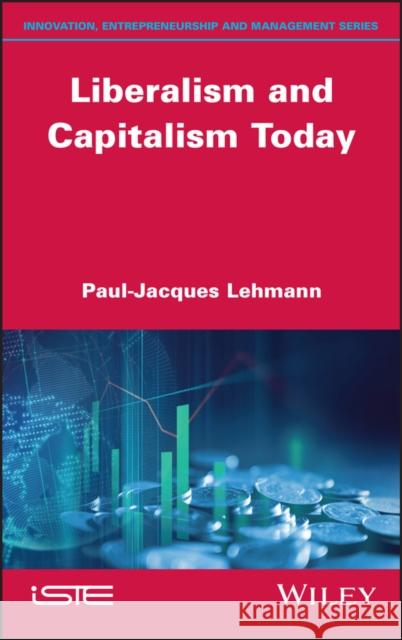Liberalism and Capitalism Today » książka



Liberalism and Capitalism Today
ISBN-13: 9781786306890 / Angielski / Twarda / 2021 / 240 str.
Liberalism and Capitalism Today
ISBN-13: 9781786306890 / Angielski / Twarda / 2021 / 240 str.
(netto: 688,37 VAT: 5%)
Najniższa cena z 30 dni: 702,51
ok. 30 dni roboczych.
Darmowa dostawa!
Introduction ixPart 1. The Conditions in Which Liberalism and Capitalism Appeared 1Introduction to Part 1 3Chapter 1. Political and Legal Conditions 51.1. Liberalism and democracy: new eldorados of political thought and political life 51.1.1. Liberalism, defender of the superiority of the individual, and its economic application, capitalism 61.1.2. The reduced role of the state and different positions in relation to monopolies 91.1.3. Democracy as a guarantee of freedom and equality 161.1.4. The economic consequences of democracy 211.2. The right of ownership as a necessary condition for savings and capital formation 231.2.1. Freedom as a condition of private property 241.2.2. Land ownership 261.2.3. Property rights and savings 271.3. The advent of the bourgeoisie 291.3.1. The hold of the military and the nobility in Antiquity 291.3.2. The emergence of the urban bourgeoisie: a Western phenomenon 301.3.3. When economic power... 311.3.4. ... transforms into political power 321.4. The nascent authority of state bureaucracy 341.4.1. Legitimate coercion by the state 351.4.2. The evolution of the activities of state bureaucracy actors 381.4.3. Advantages and disadvantages of state bureaucracy 39Chapter 2. Economic and Sociological Conditions 412.1. Trade and industry: competitors of agriculture and the craft industry 412.1.1. The lesser role of agriculture 412.1.2. The growing role of trade... 432.1.3. ... generated by free competition at national levels... 452.1.4. ... and international levels 462.2. The dangers of industrialization 512.2.1. Industrialization and the destructiveness of the division of labor for humanity 512.2.2. The appearance of an industrial aristocracy 522.2.3. Corporate concentration 562.2.4. Growing pauperism 582.3. The decisive influence of the Protestant religion on economic rationalization 622.3.1. The Protestant Ethic and the Spirit of Capitalism 622.3.2. The sacredness of work and profit 682.3.3. The need for growth 722.3.4. Rationalization of the economy 742.4. The role of money and financial markets 762.4.1. The need for money 762.4.2. The first banks 792.4.3. The first financial markets 80Part 2. The Evolution of Liberalism and Capitalism 89Introduction to Part 2 91Chapter 3. The Birth of a New Capitalism in a New World: Financial Capitalism 933.1. The emergence and development of financial capitalism 933.1.1. Globalization 953.1.2. The information revolution 983.1.3. The financial revolution 1003.2. Changes in corporate governance 1043.2.1. Taking sustainable development into account... 1073.2.2. ... and pollution 1083.3. New economic policies 1103.3.1. The need to combat rising prices 1103.3.2. Monetary policy to combat inflation 1123.3.3. Discretionary versus automatic economic policy 1133.4. From the perfection of theoretical capitalism to the crises of real capitalism 1173.4.1. Changes in the assumptions of pure and perfect competition 1183.4.2. Questioning the uniqueness of prices 1193.4.3. Expectations which are supposedly too perfect 1223.5. Recurrent causes of the crises of capitalism 1243.5.1. The beginnings of any financial crash: an innovation stemming from a need for financing 1253.5.2. From speculation to collective psychosis 1273.5.3. A monetary expansion 1283.5.4. The bursting of the financial bubble 1293.6. Some examples of crises of capitalism 1313.6.1. The crises following the discovery of the New World 1323.6.2. Crises due to the transportation revolution 1343.6.3. The 1929 crisis 1363.6.4. The 1987 crash 1383.6.5. The crisis of the new economy in the year 2000 140Chapter 4. Towards 21st Century Capitalism 1474.1. A responsible and proactive economic policy 1484.1.1. A policy of growth 1494.1.2. The search for price stability 1554.1.3. Improving the functioning of markets through positive regulation... 1564.1.4. ... in order to ensure the ethics of capitalism... 1584.1.5. ... and respect for the freedom of the market 1604.2. Finance that respects the principles of capitalism 1614.2.1. Banking regulation in the form of minimum prudential ratios 1614.2.2. Financial regulation 1674.2.3. The need for transparency on unregulated markets 1744.2.4. Regulation of the over-the-counter markets 1774.3. Renewed corporate governance 1794.3.1. Better controlled accounting standards 1794.3.2. A different kind of business management 1824.3.3. The necessity of training employees and citizens in general 184Conclusion 187References 195Index 197
Paul-Jacques Lehmann is Emeritus Professor of Economics at the University of Rouen, France. He is the author of numerous works in the monetary and financial fields, and, most recently, his research has focused on rehabilitating the great, forgotten and denigrated European authors of liberalism
1997-2026 DolnySlask.com Agencja Internetowa
KrainaKsiazek.PL - Księgarnia Internetowa









